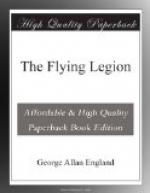“A mercy-bullet?”
“For yourself!”
The Master pondered a moment or two, as Nissr drifted on toward the now densely massed Arabs on the beach, then he said:
“You seem to know these folk well.”
“Only too well!”
The Master’s next words were in the language of the desert:
“Hadratak tet kal’m Arabi?” (You speak Arabic?)
“Na’am et kal’m!” affirmed the lieutenant, smiling. And in the same tongue he continued, with fluent ease: “Indeed I do, Effendi. Yes, yes, I learned it in Algiers and all the way south as far as the headwaters of the Niger.
“Five years I spent among the Arabs, doing air-work, surveying the Sahara, locating oases, mapping what until then were absolutely unknown stretches of territory. I did a bit of bombing, too, in the campaign against Sheik Abd el Rahman, in 1913.”
“Yes, so I have heard. You almost lost your life, that time?”
“Only by the thickness of a semmah seed did I preserve it,” answered the Frenchman. “My mechanician, Lebon, and I—we fell among them on account of engine trouble, near the oasis of Adrar, not far from here. We had no machine-gun—nothing but revolvers. We stood them off for seven hours, before they rushed us. They captured us only because our last cartridges were gone.”
“You did not save the mercy-bullet that time, eh?”
“I did not, Effendi. I did not know them then as I do now. They knocked us both senseless, and then began hacking our machine to pieces with their huge balas (yataghans). They thought our plane was some gigantic bird.
“Superstition festers in their very bones! The giant bird, they believed, would ruin their date crops; and, besides, they thirsted for the blood of the Franks. As a matter of fact, my Captain, these people do sometimes drink a little of the blood of a slaughtered enemy.”
“Impossible!”
“True, I tell you! They destroyed our plane with fire and sword, reviled us as pigs and brothers of pigs, and named poor Lebon ’kalb ibn kalb,’ or ‘dog and son of a dog.’ Then they separated into two bands. One band departed toward Wady Tawarik, taking Lebon. They informed me that on the morrow they would crucify him on a cross of palm-wood, head downward.”
“And they executed Lebon?”
Leclair shrugged his shoulders.
“I suppose so,” he answered with great bitterness. “I have never seen or heard of him since. As for me, they reserved me for some festivities at Makam Jibrail. During the next night, a column of Spanish troops from Rio de Oro rushed their camp, killed sixty or seventy of the brown demons, and rescued me. Since then I have lusted revenge on the Beni Harb!”
“No wonder,” put in the chief, once more looking at the beach, where now the war-party was plainly visible to the naked eye in some detail. The waving of their arms could be distinguished; and plainly glittered the blood-crimson sunset light on rifle-barrels, swords, and javelins. The Master loosened his revolver in its holster. “About twenty minutes from now, at this rate,” he added, “some of the Beni Harb will have reason to remember you.”




